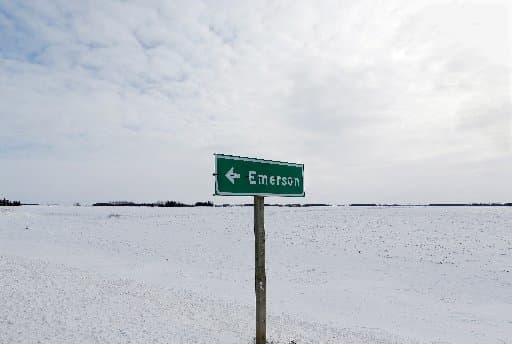TORONTO — The discovery of four bodies frozen to death in open fields near the Manitoba border with the United States perfectly illustrates why refugee advocates are asking the Supreme Court of Canada to strike down the Safe Third Country Agreement between Ottawa and Washington, said the general secretary of the Canadian Council of Churches.
“It’s just a tragedy in this particular situation,” said Peter Noteboom, general secretary of the council which, along with Amnesty International Canada and the Canadian Council of Refugees, has been seeking an end to the agreement between the two nations.
“That it takes this kind of tragedy to again shine the light on this situation — this situation really needs to be addressed soon,” he added.
Four bodies — two adults, a teen and an infant — were found on the Canadian side of the U.S.-Canada border near Emerson, Manitoba, Jan. 19. They were found within a dozen yards of the border. They had been walking through deep drifts of snow across open farm fields in temperatures of minus 35.
In 2016, Royal Canadian Mounted Police in Manitoba intercepted 444 people crossing the border illegally. In 2016, two Ghanaian refugees lost fingers to frostbite after crossing the border on foot near Emerson. In 2017, a woman’s body was found in open fields in Minnesota, near the Manitoba border. It was believed she was trying to claim asylum in Canada.
Because of the Safe Third Country Agreement, almost all asylum-seekers who present themselves at a regular border crossing are turned back into the United States. The agreement specifies that would-be refugees must apply for asylum in the first safe country where they land. Refugees who arrive in Canada by air or who cross at unofficial, unmonitored points along the border may legally apply for asylum in Canada.
It is this agreement that drives people to attempt risky border crossings in sub-zero temperatures, argue the refugee advocates behind the Supreme Court appeal.
As news broke of the bodies found in Manitoba, the U.N. High Commissioner for Refugees in Ottawa contacted The Catholic Register to express its regrets.
“UNHCR deeply regrets this tragic loss of life. Whatever the circumstances, no one should ever have to choose such a perilous journey,” the UNHCR said in an email.
In December, the Supreme Court agreed to hear the Safe Third Country appeal. The churches, Amnesty and the Canadian Council for Refugees originally won the case at the Federal Court in July 2020. The court found the agreement violated the Charter of Rights and Freedoms. In April 2021, the Federal Court of Appeal overturned that ruling. The Supreme Court is expected to hear the case in the spring.
Noteboom said the fact that people are on the run is frustrating, but that they cannot trust the civilized, democratic world to welcome them is doubly frustrating.
“I find it frustrating that people are trying to cross borders for whatever reason,” he said. “We really have an obligation, even a sacred obligation, to put in place mechanisms that order those kinds of travels and border crossings in a safe and healthy way. … The inability of the governments of the U.S. and Canada to negotiate safe and healthy border crossings for people who need to cross them is a contributing factor (to the deaths).”
A Florida man, 47-year-old Steve Shand, was charged with human smuggling in connection with the four deaths and released without bond.
“There will be people who exploit tragedy and trauma, and that’s too bad,” said Noteboom. “But there are causes, root causes further back, that we also need to pay attention to. If we’ve got a system that works, then it will diminish the role and the place for traffickers, who are themselves also a problem.”
– – –
Swan is associate editor of The Catholic Register, Toronto.













